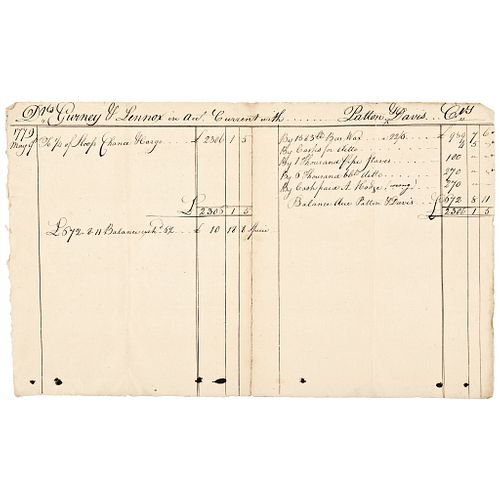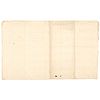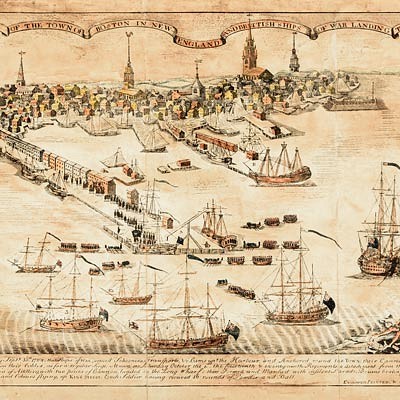1779 Goods on the Pennsylvania Privateer Sloop CHANCE (FRANCIS GURNEY) Papers
Lot 165
Categories
Estimate:
$400 - $500
Absentee vs Live bid
Two ways to bid:
- Leave a max absentee bid and the platform will bid on your behalf up to your maximum bid during the live auction.
- Bid live during the auction and your bids will be submitted real-time to the auctioneer.
Bid Increments
| Price | Bid Increment |
|---|---|
| $0 | $10 |
| $200 | $20 |
| $300 | $25 |
| $500 | $50 |
| $1,000 | $100 |
| $2,000 | $200 |
| $3,000 | $250 |
| $5,000 | $500 |
| $10,000 | $1,000 |
| $20,000 | $2,000 |
| $30,000 | $2,500 |
| $50,000 | $5,000 |
| $100,000 | $10,000 |
| $200,000 | $20,000 |
| $300,000 | $25,000 |
| $500,000 | $50,000 |
About Auction
By Early American History Auctions
Mar 20, 2021
Set Reminder
2021-03-20 12:00:00
2021-03-20 12:00:00
America/New_York
Bidsquare
Bidsquare : Autographs-Colonial-Political-Americana
https://www.bidsquare.com/auctions/early-american-history-auctions/autographs-colonial-political-americana-6509
330 Lots of Rare, Historic Autographs, Americana, Civil War Era, George Washington, Abraham Lincoln, Slavery & Black History, Revolutionary War Era, Colonial America, Federal Period, War of 1812, Colonial Currency, Indian Peace Medals & more... Early American History Auctions auctions@earlyamerican.com
330 Lots of Rare, Historic Autographs, Americana, Civil War Era, George Washington, Abraham Lincoln, Slavery & Black History, Revolutionary War Era, Colonial America, Federal Period, War of 1812, Colonial Currency, Indian Peace Medals & more... Early American History Auctions auctions@earlyamerican.com
- Lot Description
American Revolution
1779 Pennsylvania Privateer Sloop "Chance" Ships Goods
(GENERAL FRANCIS GURNEY) (1738-1815). Philadelphia Businessman, Civic Leader, and Revolutionary War Lieutenant Colonel, served from the French and Indian War to the Whiskey Rebellion, in 1799 was promoted to Brigadier General.
May 9, 1779-Dated Revolutionary War Period, Manuscript Document, being an Account Document between "Gurney & Lennox" and "Patton & Davis" of Goods Shipped by the well known Pennsylvania Privateer Sloop "Chance." This original Document measures about 8" x 13" being well written in rich brown ink upon clean, laid period paper. It is folded and slightly creased, the center vertical fold was torn and repaired with document tape on the reverse.
Captain John Adams, who listed his address as Philadelphia, was commissioned to the Pennsylvania Privateer Sloop Chance on April 11th, 1776. The Chance was listed as having four guns and forty-five men. He sailed in company with the Pennsylvania Privateer Sloop Congress (Commander George McAroy) from Philadelphia on April 15th. On April 22nd the two privateers, accompanied by other vessels, sailed down the Cape May Channel into Delaware Bay and escaped HM Frigate Roebuck after a cat and mouse game. The two privateers sailed south on a fabulous cruise. A series of rich prizes, the schooner Thistle, ship Reynolds, ship Lady Juliana, and ship Juno were captured. The two privateers arrived at Egg Harbor, New Jersey, before 5 June 1776. These prizes were extremely valuable. One writer estimated that the owners would receive 5,000 each and the sailors 500 each from the sale of the cargoes and vessels. An ugly little incident now came to light. The wealth of the Lady Juliana had been too much for skipper John Adams of the Privateer Chance: he had helped himself to the loot. On 9 August 1776, Philip Moore, on behalf of the owners, filed suit in the Pennsylvania Admiralty Court to recover 1000 dollars, three bags of coins, eight pounds of gold, and plate, valued at 1508.0.15, which Moore claimed Adams had embezzled. Adams' defense was to deny jurisdiction of the court. For full references to this cruise and additional continued history, see: Pennsylvania Privateer Sloop Chance.
Francis Gurney commanded the 11th Pennsylvania Regiment, had also served during the French and Indian War, participating in the Canadian campaign and against the French West Indies Islands, in the capture of Guadeloupe. Gurney was wounded at Iron Hill on September 3, 1777. During the Whiskey Rebellion his military services were called upon, where Gurney led the 600 strong 1st Philadelphia Militia of the against rebelling farmers in Western Pennsylvania.
The "Patton" of "Patton & Davis" is apparently (Colonel) John Patton. Colonel John Patton (1745-1804), Officer and Philadelphia merchant. Patton was a Colonel of the Sixteenth Regiment of Pennsylvania troops. For a time, he had charge of the defenses of Philadelphia. He was also one of the merchants of Philadelphia who raised, on their own personal responsibility, some two hundred and sixty thousand pounds to help Washington and the army.
Patton married Jane Davis.
Francis Gurney (1738-1815), a native of Bucks County, Pa., served in the French and Indian War, and as a colonel with Pennsylvania troops during the Revolution. After the war he became a merchant in Philadelphia and for a time was warden of the post of Philadelphia, a Philadelphia alderman, and a member of the city council (Pennsylvania Magazine of History and Biography, 47 (1923), 175-76).
After the war, Gurney returned to Philadelphia where he began his career as a merchant. During the American Revolution, he donated heavily to the cause both monetarily and in military service. He served as a captain with the Grenadier Company, 3rd Regiment, Philadelphia Militia, and was later promoted to lieutenant colonel. He resigned his commission on October 22, 1777 after a failure to receive an expected promotion. Gurney served throughout the remainder of the war and its aftermath in civilian offices.
In 1794 he was in command of the 1st Regiment of the Philadelphia Brigade with the rank of colonel. Apparently Gurney had considerable difficulty maintaining discipline among his troops, for Washington wrote Hamilton, 26 Oct., on his way back to Philadelphia, that "I heard great complaints of Gurney's Corps (&c some of the Artillery) along the road to Strasburgh. . . . In some places, I was told they did not leave a plate, a spoon, a glass or a knife; and this owing, in a great measure I was informed, to their being left without Officers. At most if not all the encampments, I found the fences in a manner burnt up. I pray you to mention this to Govr. Mifflin" (Library of Congress: Hamilton Papers). In 1799, he was promoted to Brigadier General.
In addition to his other civic and military duties, Gurney served on the Board of Trustees of Dickinson College from 1798 until his death. He was often entrusted with College business in Philadelphia and Washington, D. C. Francis Gurney died on May 25, 1815.
Our Auction Contents:
Black History & Slavery: (Lots 1 - 63)
Abraham Lincoln Related: (Lots 64 - 74)
Historic Autographs: (Lots 75 - 235)
Colonial America: (Lots 236 - 261)
Revolutionary War: (Lots 262 - 304)
George Washington Related: (Lots 305 - 306)
Early American Guns & Weapons: (Lots 307 - 318) - Shipping Info
-
Early American provides in-house worldwide shipping. Please contact us directly if you have questions about your specific shipping requirements.
-
- Buyer's Premium



 EUR
EUR CAD
CAD AUD
AUD GBP
GBP MXN
MXN HKD
HKD CNY
CNY MYR
MYR SEK
SEK SGD
SGD CHF
CHF THB
THB












